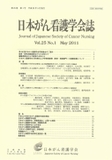Japanese
English
- 販売していません
- Abstract 文献概要
- 参考文献 Reference
- サイト内被引用 Cited by
要旨
本研究の目的は,初めて化学療法を受けながら生活する肺がん患者が,自己効力感を高めその人らしく生きるためにエンパワーメントを促進する対話面接を行い,患者の変化の過程を明らかにすることである.参加者は研究参加に同意の得られた告知後初めて化学療法を受ける50〜60歳代男性患者3名であった.研究方法は質的帰納的デザインで,Freireのエンパワーメント理論に基づいたChangらの対話面接に一部修正を加えたものを使用した.面接の逐語録と研究者の自己内省ジャーナルを記述データとし,一事例ずつコード化,サブカテゴリー化ののち,参加者共通の類似性や相違性を検討しながらカテゴリー化した.研究者の内容は対参加者別に分析し,エンパワーメント理論をもとにコード化,サブカテゴリー化した.さらに,対参加者共通の類似性や相違性を検討しながらカテゴリー化した.参加者と研究者の両者のカテゴリーは,変容という視点から局面として経時的に位置づけた.参加者に共通する変化の過程は,局面1:パートナーシップの開始,局面2:パワーの低下の表出,局面3:自己の意識化,局面4:自己効力感の回復,局面5:肺がん治療に向けたパワーの回復の5つであった.この過程では,がん患者の「自己の意識化」は欠くことのできない局面であることが既存の研究同様に明らかになった.また診断から治療を受け入れる短い期間でも,患者が「新たな自信」を得られるような看護師との相互変容の重要性が示唆された.
Abstract
This aim of this study was to elucidate the process of changes in empowerment by conducting interviews for promoting empowerment with lung cancer survivors receiving chemotherapy. Three male patients in their 50s or 60s undergoing first time chemotherapy for lung cancer agreed to participate. We used a partially modified version of Chang et al.'s interview model, which was based on Freire's theory of empowerment. Verbatim records of all recorded respondent interviews and researcher's journal were collected as descriptive data, which was individually coded and categorized. Subsequently, aspects of the empowerment process that were common to all three participants were identified from the perspective of mutual changes among participants and the researcher. Participants were supervised by the qualitative researcher throughout the entire process.
The results showed five stages of change common to all participants: Stage 1)initiation of partnership with the researcher, Stage 2)helplessness associated with diagnosis of cancer, Stage 3)critical consciousness, Stage 4)recovery of self-efficacy and Stage 5)recovery of the power to undergo lung cancer treatment.
The results also suggested as with previous studies, critical consciousness was identified as an essential stage. In addition, the present findings suggest that mutual changes among cancer survivors and nurses that promote "new confidence" among cancer survivors are important even during the short period between diagnosis and acceptance of treatment.
Copyright © 2011, Japanese Society of Cancer Nursing All rights reserved.


